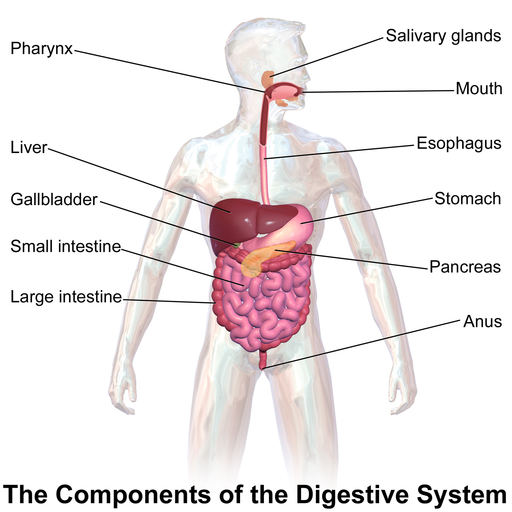Kids Want To Know: Why does my tummy feel weird when we go over a hill?
Our new house is located on a long, hilly, windy, and paved road. The speed limit ranges from 45-50, which is just fast enough to give you that funny free-fall feeling in your belly as you top a couple of the hills. This has led the kids to ask that age old question:
Why Do I Get That Weird Feeling In My Stomach When I Go Down A Hill?

Image Credit
To answer this question, we’re going to have to dive into some human anatomy, as well as some physics. But, don’t let that scare you! We will only be swimming in the shallow end of either topic.
Gravity
We’re all familiar with gravity. It’s that ever-present force that keeps us all grounded. But, what is gravity?The KISS definition of gravity goes something like this:
Gravity is the force by which a planet or other body draws objects toward its center.
Allow me to draw your attention to the last 3 words of that definition: ...toward its center. If you went to Wal-Mart and asked 100 random people the question ”What is gravity?”, I would bet that most of them would say something about a force that pulls us downward. But, what is down? Well, our word “down” is used to describe a local experience where we are being pulled toward the ground. In the bigger picture, we are actually being pulled toward the center of Earth. The only thing keeping us from plunging into the core is something called the normal force.
The Normal Force
The normal force is a contact force that keeps solid objects from passing through each other when they collide. For example, gravity is pulling you toward the center of the Earth (you can think of it as down) at an acceleration of 9.8 m/s2. This means that, if you were simply falling through nothingness without any friction or air resistance, you would speed up by 9.8 m/s every second. So starting from 0, after one second, you would be travelling downward at 9.8 m/s; after two seconds, you would be travelling 19.6 m/s; after three seconds, you would be going 29.4 m/s; and so on.However, since your feet are in contact with the ground, you experience the normal force. The cool thing about the normal force is that it can be however strong as it needs to be, but it is only ever as strong as it has to be. Think about it: the same normal force that holds up buildings is also holding you up, and you’re not being catapulted through the air.
What’s On The Inside
Now, let’s talk anatomy. You may imagine that your guts are just kind of floating around in your abdomen; but things are actually quite organized in there, with everything being held in its designated spot by muscles and ligaments.
Image Credit
See where the liver is in the diagram? Just above that is a muscle called the diaphragm that contracts and relaxes to control the lungs. The liver is connected to the underside of the diaphragm by ligaments and a type of tissue called mesentery. If you’ve ever dissected an animal in school or processed a kill after a hunt, you have probably seen the mesentery and how it holds all of the guts together inside of the animal. It usually looks like a sheet of fat that is stuck to everything.

Image Credit
While the liver is held in place pretty securely you can see that the mesentery has a little bit of give to it, so it holds everything in its place while having enough flex in it to cushion your intestines as you run and everything starts trying to bounce around in there.
But, What Does All Of This Have To Do With That Funny Feeling In My Belly?
As you top the hill, it is as if the ground has been pulled out from under the vehicle. With the normal force from the road gone, your car suddenly begins to fall. Now, there is nothing to hold the seat up; nothing to hold you up. As you begin to fall, that tension on the nerves of your ligaments and mesentery goes away, signaling to the brain that you are in free-fall.

Image Credit
And that’s about all we know. Scientists aren’t really sure why our brain interprets the free-fall signal it receives as that particular feeling that we get.
Astronauts Get That Sinking Feeling
Now that we have learned how being in free-fall causes that sinking sensation, let’s talk about some people who are in constant free-fall: astronauts.It is a very common misconception that ”there is no gravity in outer space”, but gravity exists everywhere! Sure, the strength of a gravitational pull decreases the farther you get from an object’s center, but gravity is still there. In fact, for something like the International Space Station to counter gravity and remain in orbit, it must travel a constant 17,150 miles per hour! This ensures that it is never able to fall back to Earth. For a really good explanation on how it works, check out this video from SciShow.
Since astronauts are in free-fall, they live under conditions where the ligaments and mesentery holding their organs together are perpetually relaxed. Therefore, they constantly have that WEEEE feeling. Apparently, it takes several days for them to become accustomed to it, and even then, there may be times when they relapse and get motion sickness. So, I guess if you’re a hardcore roller coaster junkie, maybe you should look into becoming an astronaut.
Cool article! It is interesting that the mesentery serves a function in balance and coordination through the nerves it interacts with. There was a bunch of hype in the news recently about how many functions the mesentery has. Some authors even declared it an organ because of it's newfound importance.
We've known about the mesentery and most of its functions since the late 1800's. Another great example of how we can learn new things everyday. Thanks again for the article!
Very interesting piece @sustainablyyours. Same issue I always have with merry-go-rounds and roller-coasters too. One could end up jaded and puking from such "supposedly" fun activities. Thanks for breaking down the phenomenon quite simply.
Thats why I dont ride rollercoasters or ride boats when its storming because I hated the uncomfortable feeling on my belly. I hated it so much! This article is very informative and science can definitely explains things.

Really awesome
I had that feeling many time in the giant wheel and everyone must have that but what makes us vomit in the coarse of this weird feeling.
May be I have to look inside some biochemical processes to see what happens which forces us to vomit.
Thanks for sharing
Being A SteemStem Member
nice post keep going